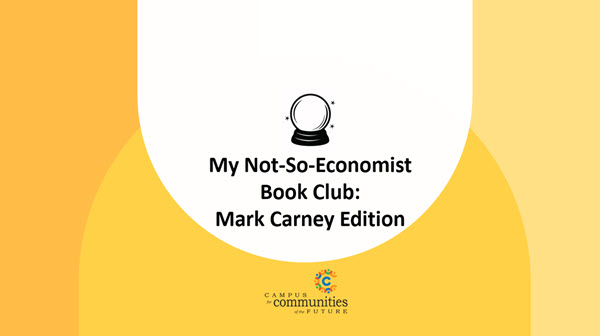My Not-So-Economist Book Club: Mark Carney Edition

I don’t own a crystal ball. If I did, you’d find me sunning on my private yacht courtesy of perfectly timed lottery picks. But, in 2021, I did buy Mark Carney’s book Values: Building a Better World for All. Full disclosure: I may have approached some of the denser chapters with the same enthusiasm I reserve for assembling IKEA furniture — skim for what’s crucial and generally avoid anything that gives me a headache. In my defence, the target audience for the book is likely those who wear more suits in a month than I’ve owned in my lifetime.
However, despite my past often inconsistent voting patterns, I was so enthralled with Carney, I became the unappointed manager of a campaign that was non-existent at the time, telling colleagues and family members his values would get him elected as the next Prime Minister. And, poof, he was.

Why Did “Values” End Up On My Bookshelf?
Reason #1: The Title
Anything with the word “value” strikes a chord with my inner philosopher (who, incidentally, lives right next door to my inner Pollyanna) because I’d started to believe that values are the only reliable compass when tough decisions must be made.
Reason #2: The Wine Story
In the sample reading of his book, Carney shares a story about a lunch he attended at the Vatican with an eclectic mix of other guests to discuss the future of the market system.
Pope Francis made a surprise appearance and shared a parable about wine, explaining why they had been invited.
“Our meal will be accompanied by wine. Now, wine is many things. It has a bouquet, colour, and richness of taste that complement the food. It has alcohol that can enliven the mind. Wine enriches all our senses.
At the end of our feast, we will have grappa. Grappa is one thing: alcohol. Grappa is wine distilled.
He continued: Humanity is many things – passionate, curious, rational, altruistic, creative, self-interested.
But the market is one thing – self-interested. The market is humanity distilled.”
And then he challenged the group: Your job is to turn the grappa back into wine and the market back into humanity.

What Does Turning Grappa Back Into Wine Tell Us About Economics?
The parable frames Carney’s argument that our economic systems and markets have become too focused on self-interest and measurable value, losing sight of the broader values that create a healthy, resilient society.
For me, the parable contributed to economics becoming less of a foggy spreadsheet and more of a spirited dinner conversation—hope and clarity decanted in the same glass.
To his credit, Carney now reflects his extensive knowledge and experience as our Prime Minister. He has initiated strategies to reflect justice, opportunity, resilience, solidarity, and stewardship—so that public policy and markets serve the broader needs of all Canadians – economic unity, defence, economic resilience, innovation, sustainability, and more.
So, What’s Missing?
There’s no doubt Carney is brilliant and personable, and brings critical learnings and extensive experience as the Prime Minister. There’s just one issue.
While many recognize his good intentions and a clear sense of urgency, Carney appears biased toward institutional, large-scale infrastructure and national projects and reforms designed and delivered using a top-down approach (fair enough because they are needed). However, my bias and experience, as well as those of many others, lean more toward a bottom-up approach because that’s what we’re living each day.
A top-down approach doesn’t always work, so it isn’t an either/or situation but instead and/both.

At the local level lies a mighty army of innovators and entrepreneurs, systems-catalysts, agile small and medium-sized businesses, and caring, resourceful citizens—just waiting for the policy, support, and funding that would serve as a real shovel (or corkscrew, depending on the day) for making a difference.
Thoughts from the Grassroots
If Prime Minister Carney wants to turn grappa back into wine in a pop-the-cork kind of way that would enable ordinary Canadians to benefit more directly, maybe he could consider policy, support, and funding at the local level that would increase:
1. the capacity of local systems leaders (including those who may or may not have a title but have a track record of getting things done);
2. multi-sector and systemic collaboration;
3. capacity-building for innovative venture-building enterprises that deliver a social purpose;
4. equitable or shared ownership;
5. application of advanced technology and AI;
6. peer-to-peer sharing and learning.

We’re not saying it is easy. There likely will be a few hangovers involved, but those at the grassroots level don’t expect those at the grasstops to solve these challenges on their own. It is more about implementing a process that allows grassroots voices to be heard and connected to those at the grasstops (and vice-versa).
Maybe Carney’s next book could be a masterclass in bottom-up transformation and innovation? It could be as satisfying and complex as a perfectly aged bottle of wine.
Posted on 07-22-25
Next entry: From Complexity to Clarity
Previous entry: Redefining Success: Balancing Prosperity, Well-Being, and Purpose

 Brenda Herchmer is the owner of Grassroots Enterprises, a community development consulting company.
Brenda Herchmer is the owner of Grassroots Enterprises, a community development consulting company.